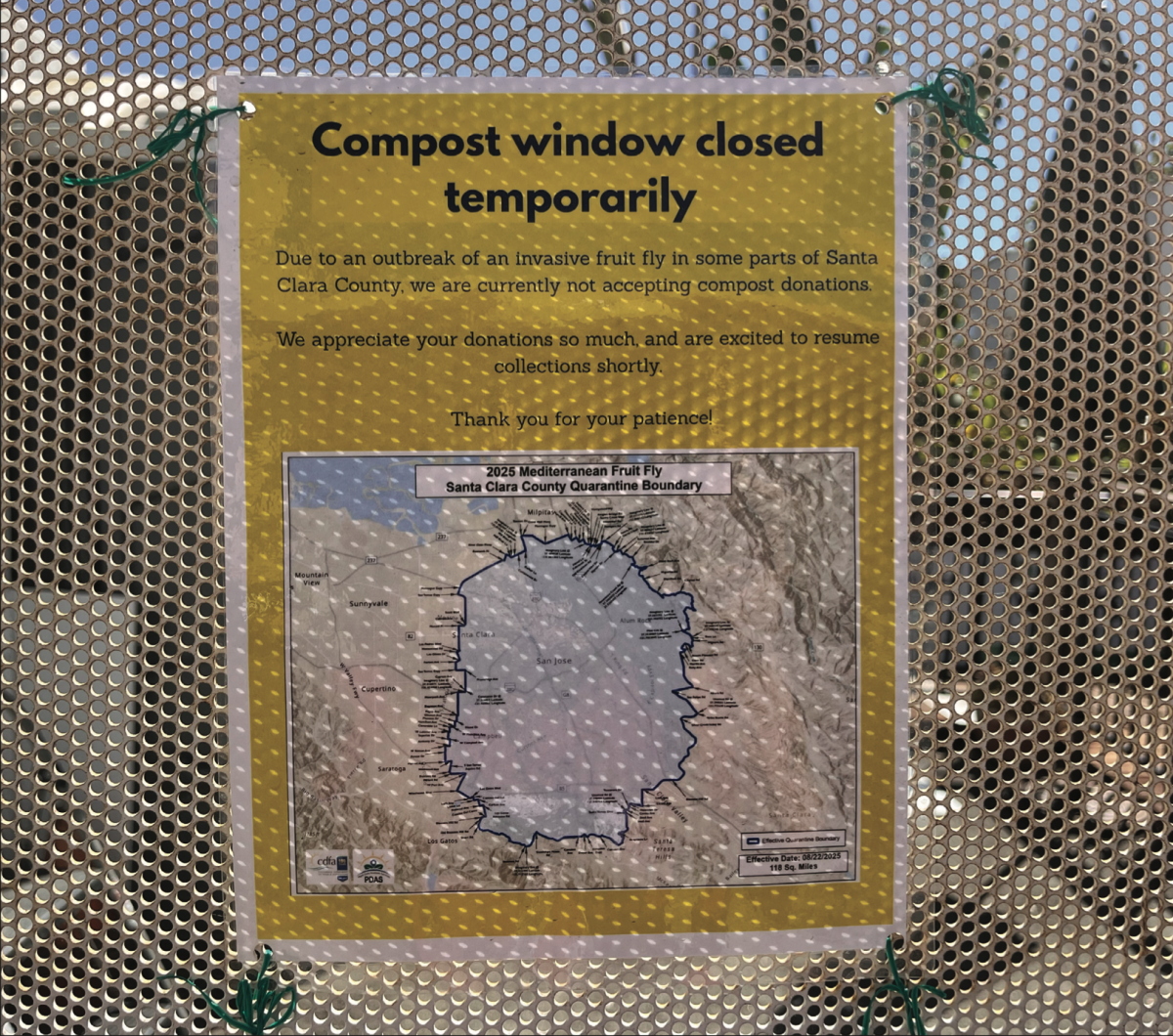
Joaquin Cruz
San José State community garden displays a sign issuing a warning of Mediterranean fruit flies in the area.
The San José State Campus Community Garden has made changes to its harvest because of the recent guidelines from the California Department of Food and Agriculture.
The department recently found an increase in Mediterranean fruit flies, or medflies, in the San Jose area, according to an Aug. 28 press release by Santa Clara County’s Division of Agriculture.
These flies pose a threat to agriculture for communities that rely on produce that comes from the area, according to the same.
Ruby Howard, the Campus Community Garden coordinator, said the garden staff are still waiting for updates on when the quarantine will be lifted.
“It’s important that students understand the gravity of the situation, and the risks of Medflies, and that we all work together to stop their spread,” said Howard.
Medflies lay eggs beneath the skin of fruit, resulting in maggots to eat the fruit, leaving the produce to slowly rot, then drop to the ground, according to a California Department of Food and Agriculture brochure.
If medfly traces are found in produce, it makes it inedible and unmarketable, which is a cause for fear over the damage that agriculture markets potentially face from the small outbreak.
On August 20, the CDFA released an official statement for Santa Clara County regarding the outbreak, with crucial information about the financial impact that could be faced if not handled properly.
The release states that the combined 2024 gross production value of products affected by medfly infestations amounted to $17.93 billion.
“Agriculture is one of our biggest industries, so the impact would be felt broadly,” said Howard. “Other states or countries could ban CA agricultural imports, causing huge financial losses.”
Among these changes is a halt to operations from the compost window, and some produce will also not be harvested for the Spartan Food Pantry, according to a Sept. 5 SJSU Campus Community Garden post.
Brenjielyn Cuneta, the basic needs coordinator of the Spartan Food Pantry, said Howard told the Food Pantry staff about the changes the pantry can expect.
“They will be discontinuing their delivery and distributing produce,” said Cuneta. “However, they let us know that they would still be helping us by picking up our compost for their fertilizer.”
Howard said there are currently no medflies or eggs found in the garden, but quarantine protocols still have to be followed.
“We are not allowed to compost any fruit grown within the quarantine area,” said Howard. “We can process and distribute produce onsite through our events, which is what we did at our Harvest Festival last Wednesday.”
The community garden opened in 2014 and maintains a student-led operation for sustainable organic produce, according to the community garden’s webpage.
Kimberly Evans, a fourth-year English education student, relies on the food pantry and the resources it offers for students.
“It would definitely affect my diet and my budget, but at the same time, there’s not much that can be done about it,” said Evans. “It might affect how much produce is available, but I trust SJSU to make sure that all the food they offer is safe.”
Howard and the Food Pantry are staying in contact to compose new ways to implement the use of the garden’s produce still available.
Most produce that goes to the food pantry typically comes from Second Harvest of Silicon Valley, playing a crucial role in produce, according to the Spartan Food Pantry webpage.
“We were discussing ways we can use the produce. We thought about maybe donating it for cooking lessons with the nutrition department,” said Cuneta.
SJSU has programs that focus on student interactions with cooking and hands-on experience with student-led kitchens.
The Cooking Healthy, Eating Well program, or CHEW, offers cooking classes to teach students to make affordable meals, typically offered as a course during semesters, according to the CHEW webpage.
The Wellness and Health Inspired Student Kitchens, or WHISK, offers similar tools for students, but with a focus on nutrition and healthier options for food and cooking, according to the WHISK website.
Despite new guidelines, the Campus Community Garden and food pantry will continue to offer open hours, but Howard urges the community to be aware of the sudden changes.
“Volunteers and students should know that we cannot accept any food scrap donations, and will not be able to let them harvest if they come during volunteer hours,” said Howard.